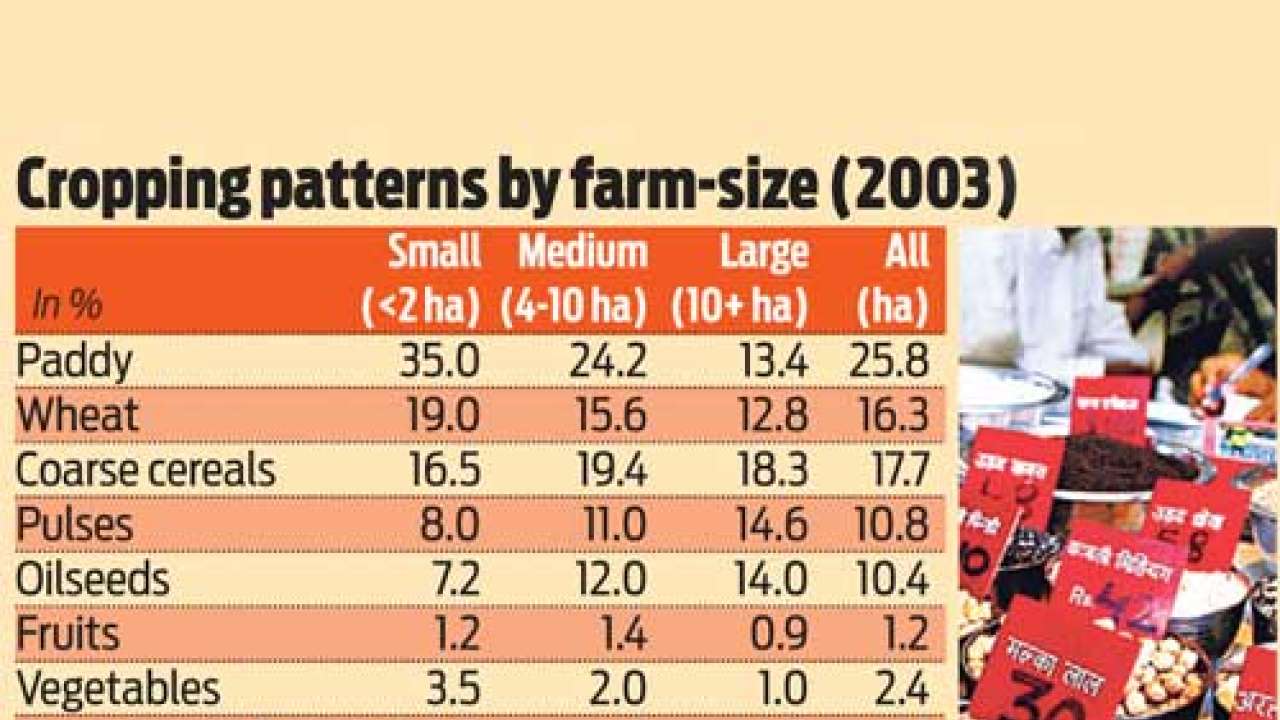
Normally, small farmers tend to be hardworking and frugal people the world over. They have a sense of pride and honour. They do not like doles, because they believe they can take care of themselves, given the right access to markets and products. They are honest, and are often willing to take up the responsibility of clearing loans taken by their parents because it’s eventually a matter of honour. Till, of course, the Congress -- later as the UPA -- in India asked them not to repay loans and taught the honest to become dishonest. If politicians really wanted to help farmers, they could have given them money to repay loans first. But no. Politics comes before honour, you see.
Now, it’s the turn of the Food Security Act (FSA). It will hurt small farmers first. And then, it will hurt the nation grievously. Sounds far-fetched? Not really. Take a look at the table.
Small farmers focus on growing rice and wheat, accounting for over 55% of crop share annually. Bigger farmers prefer more profitable crops like oil seeds and cotton. So, is the small farmer dumb?
No. He grows more rice and wheat because he knows that he must first provide for his own family’s food consumption. Most small farmers end up consuming almost 50-70% of the rice and wheat they grow, and sell only the remainder.
Even here they face difficulties. Though the government has a food procurement policy for rice and wheat, government-owned procurement agencies have their respective quotas. So, they first procure rice and wheat from the more powerful – hence, bigger -- farmers, and only then look at offerings from a fraction of small farmers. As a result, many small farmers sell their rice and wheat at distress prices – often 30% lower than procurement prices which, last year, were around Rs 12 and Rs 13 per kg, respectively. As a result, small farmers often got Rs 8-10 for the grain that they chose to sell (http://www.dnaindia.com/analysis/column-food-security-bill-a-legislation-that-will--1881286).
With the FSA kicking in, small farmers will try to sell all the wheat and rice they produce, as the Act promises them wheat and rice for consumption at under Rs 2 and Rs 3 a kg, respectively. But, as is the case today, procurement agencies will not be able to procure more – they already fail to store the limited grain they procure currently. Hence, small farmers will be forced to sell much more grain at distress prices. However, in the face of a ‘market’ price of Rs 2-3, thanks to the FSA, distress prices will hover closer to Rs 2/kg. Expect small farmers to lose a lot more money this year.
So, for the next season, they will stop growing rice and wheat, and opt for oil seeds or cotton instead. This will mean lower grain production by around 20% less than current levels. That, in turn, could see India slipping from a grain surplus country to a grain deficit nation. The Food Security Act will soon result in increasing food insecurity.
Is there a way out? Yes. Give the poor, including small farmers, money to manage their food consumption requirements. But do not tinker with market prices. When you tinker with market prices, you disrupt normal cycles of production and consumption, and are soon confronted with unintended consequences.
But without dual prices – for food, oil, kerosene and a host of other items – how will political parties siphon out money?
Well, that is a question that economics alone cannot answer.